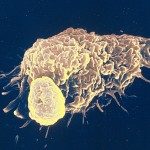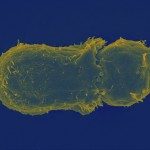Lien vers Pubmed [PMID] – 15714472
Proteomics 2005 Feb;5(3):667-74
Protein analysis by database search engines using tandem mass spectra is limited by the presence of unexpected protein modifications, sequence isoforms which may not be in the protein databases, and poor quality tandem mass spectrometry (MS/MS) of low abundance proteins. The analysis of expected protein modifications can be efficiently addressed by precursor ion scanning. However, it is limited to modifications that show such a characteristic loss in a peptide independent manner. We observed that proline and aspartic acid induced backbone fragmentation is accompanied by a low intensity signal for loss of H3PO4 for several pSer- or pThr-phosphopeptides. We describe here the use of peptide-specific fragments that can be used after a protein was identified to allow in-depth characterization of modifications and isoforms. We consider high abundance fragments formed by cleavage at the C-terminal side of aspartic acid, at the N-terminal side of proline and low mass ions such as a2, b2, b3, y1, y2, and y3. The MS/MS dataset is filtered for each sequence tag of interest by an in silico precursor ion scan. The resulting extracted ion traces are then combined by multiplication to increase specificity. Since the strategy is based on common peptide segments which are shared by different isoforms of peptides it can be applied to the analysis of any post-translational modification or sequence variants of a protein. This is demonstrated for the cases of serine and threonine phosphorylation, histone H1 acetylation and the spotting of multiple H1 isoforms.


